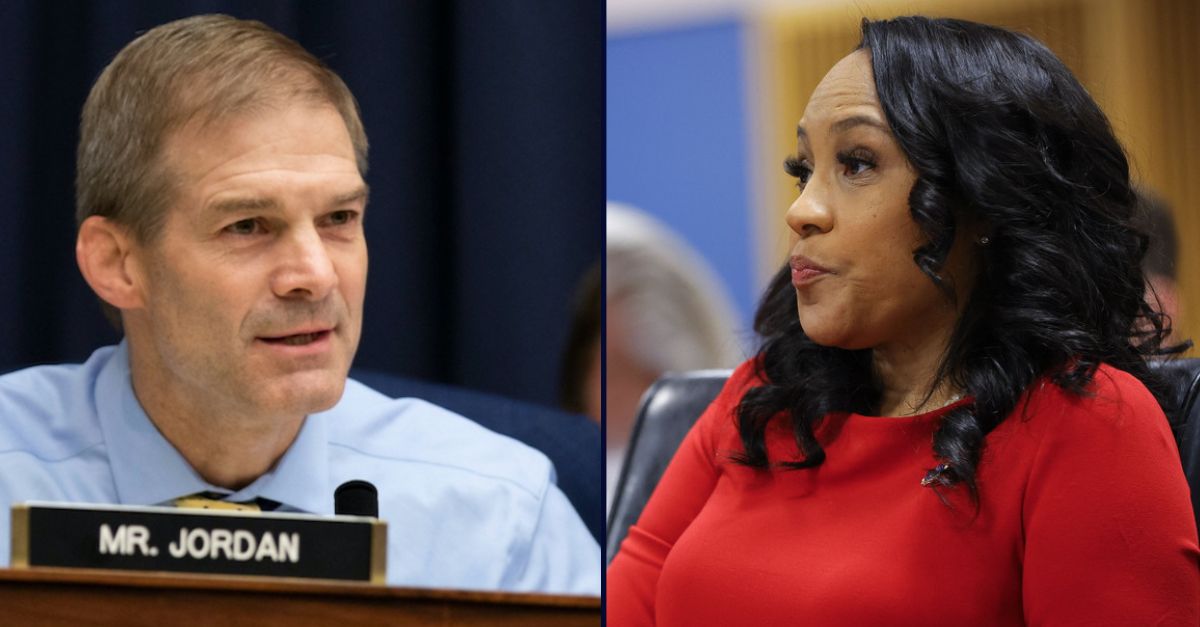
Left: Washington, DC — JULY 12: Rep. Jim Jordan (R-OH) asks Deputy Assistant FBI Director Peter Strzok a question on July 12, 2018 in Washington, D.C. (Photo by Alex Edelman/Getty Images). Right: Fulton County District Attorney Fani Willis arrives during a hearing on the Georgia election interference case, Friday, March, 1, 2024, in Atlanta (AP Photo/Alex Slitz, Pool).
Fulton County District Attorney Fani Willis and Rep. Jim Jordan‘s House Judiciary Committee are still at loggerheads over information about failed criminal investigations into President Donald Trump.
In a series of letters sent on Thursday, congressional investigators pressed several members of the district attorney’s staff to provide testimony and documents related to the since-defunct House select committee investigating the Jan. 6 attack. Those requests, the letters note, are a long time in the making — and have long been delayed.
While Jordan and his fellow Republicans on the committee have been asking Willis herself to answer questions and provide documents for nearly two years, the present staff requests began in February.
“On February 6, 2025, the Committee wrote to you requesting documents relating to the Fulton County District Attorney’s Office’s (FCDAO) coordination with the partisan January 6 Select Committee during its politically-motivated prosecution of President Donald J. Trump, and that you appear for a transcribed interview,” one of the letters reads. “The letter asked that you comply with our requests by February 20, 2025.”
In turn, the district attorney’s staff wrote back with guidance from their boss, which the latest letters partially recall.
The committee describes that guidance as follows:
On that date, we received an email from you confirming receipt, and stating that you received a letter from District Attorney Fani Willis in which she “inform[ed you] that any [responsive] documents and information are the exclusive property of the [FCDAO]” and that you are “not authorized to release any potentially responsive items to any outside party whatsoever.”
On the other hand, the epistolary communications between both sides reflect something different from outright refusals.
One staffer, Chief Senior District Attorney Donald Wakeford, wrote back to request a 30-day extension to obtain personal counsel and seek legal advice, according to the current letter addressed to him.
The committee granted the extension, the 30 days went by, and Wakeford requested another extension, according to the letter. A phone call ensued and days later, Wakeford was represented by counsel who followed up with the committee.
Similar letters were sent to Deputy District Attorney Will Wooten, Assistant Chief Investigator Michael Hill, and Assistant Trina Swanson-Lucas, according to Atlanta-based Fox affiliate WAGA.
Now, Jordan and his fellow Republicans suggest they might be close to losing their patience over the apparent stonewalling.
“It has been 70 days since the Committee first requested your voluntary cooperation with our oversight,” the letter goes on. “Upon your request, the Committee granted you an extension for the purpose of obtaining counsel to represent you in this matter. You have had sufficient time to obtain counsel, and, in fact, you currently have counsel representing you before the Committee. There is no reason for further delay.”
The initial committee-led inquiry into Willis began in August 2023 with a request for files related to her office’s “receipt and use of federal grant funds issued by the U.S. Department of Justice.”
Two additional letters asking for substantially the same materials followed in September and December 2023.
In January 2024, the district attorney’s fortunes began a long slide as several codefendants in the racketeering (RICO) and election subversion case against Trump sidelined the prosecution. This disruption — still ongoing — was made possible by Willis’ romantic relationship with since-axed, then-lead prosecutor Nathan Wade.
In a lengthy section of the current letters, Jordan and his colleagues sketch out the basis of their authority to conduct such investigations.
“As we explained in our February 6 letter to you, the FCDAO’s politically motivated prosecution of a President implicates substantial federal interests, and its coordination with the partisan January 6 Select Committee raises additional questions relevant to the Committee’s oversight into political prosecutions to inform potential legislative reforms,” the letter reads.
The letters also muse about retaliatory steps, though such action might be considered far-fetched or, at least, far-off and complicated.
“For example, the Committee may consider legislative proposals, such as amending the federal officer removal statute — codified at 28 U.S.C. § 1442 — to broaden the criteria under which state cases against federal officials can be moved to federal court, or requiring state prosecutors to disclose any coordination with congressional committees or federal entities when pursuing cases against current or former federal officials,” Jordan writes.
Love true crime? Sign up for our newsletter, The Law&Crime Docket, to get the latest real-life crime stories delivered right to your inbox.
The letters, however, do not explicitly threaten anything and remain relatively cordial.
“Please produce the requested documents and information, as well as ask your counsel to contact Committee staff to schedule your transcribed interview,” the investigators continue.
To that end, Willis’ staff was given a new deadline of 5 p.m. on May 1 for compliance.








